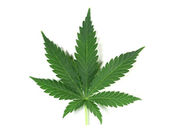More effective than placebo for reducing seizure frequency, achieving seizure freedom
WEDNESDAY, March 7, 2018 (HealthDay News) — For pediatric-onset treatment-resistant epilepsy, cannabinoids are effective as an adjunctive treatment for reducing seizure frequency by 50 percent or more, according to a review published online March 6 in the Journal of Neurology, Neurosurgery & Psychiatry.
Emily Stockings, Ph.D., from the National Drug and Alcohol Research Centre in Sydney, and colleagues reviewed the evidence for cannabinoids as adjunctive treatments for treatment-resistant epilepsy. Data were included from six randomized controlled trials and 30 observational studies. The outcomes of interest were 50 percent or more seizure reduction, complete seizure freedom, and improved quality of life.
The researchers found that, compared with placebo, cannabidiol (CBD) 20 mg/kg/day was more effective for reducing seizure frequency by 50 percent or more (relative risk, 1.74). For one person using CBD to experience a 50 percent or greater seizure reduction, the number needed to treat was eight. CBD was also more effective than placebo for achieving complete seizure freedom and improving quality of life (relative risks, 6.17 and 1.73, respectively). However, CBD was associated with increased risks of adverse events and serious adverse events (relative risks, 1.24 and 2.55). Overall, pooled across 17 observational studies, 48.5 percent of patients reported 50 percent or greater reductions in seizures; 8.5 percent were seizure-free in 14 observational studies.
“Pharmaceutical-grade CBD as adjuvant treatment in pediatric-onset drug-resistant epilepsy may reduce seizure frequency,” the authors write.
Several authors disclosed financial ties to the pharmaceutical industry.
Copyright © 2018 HealthDay. All rights reserved.








